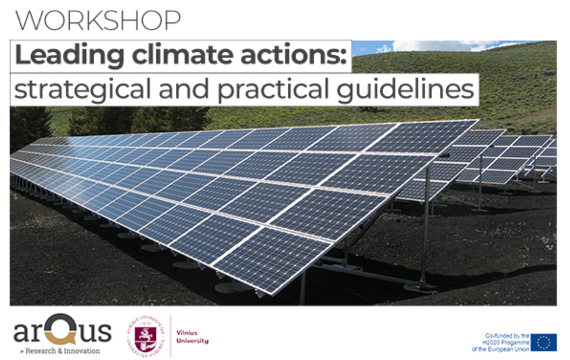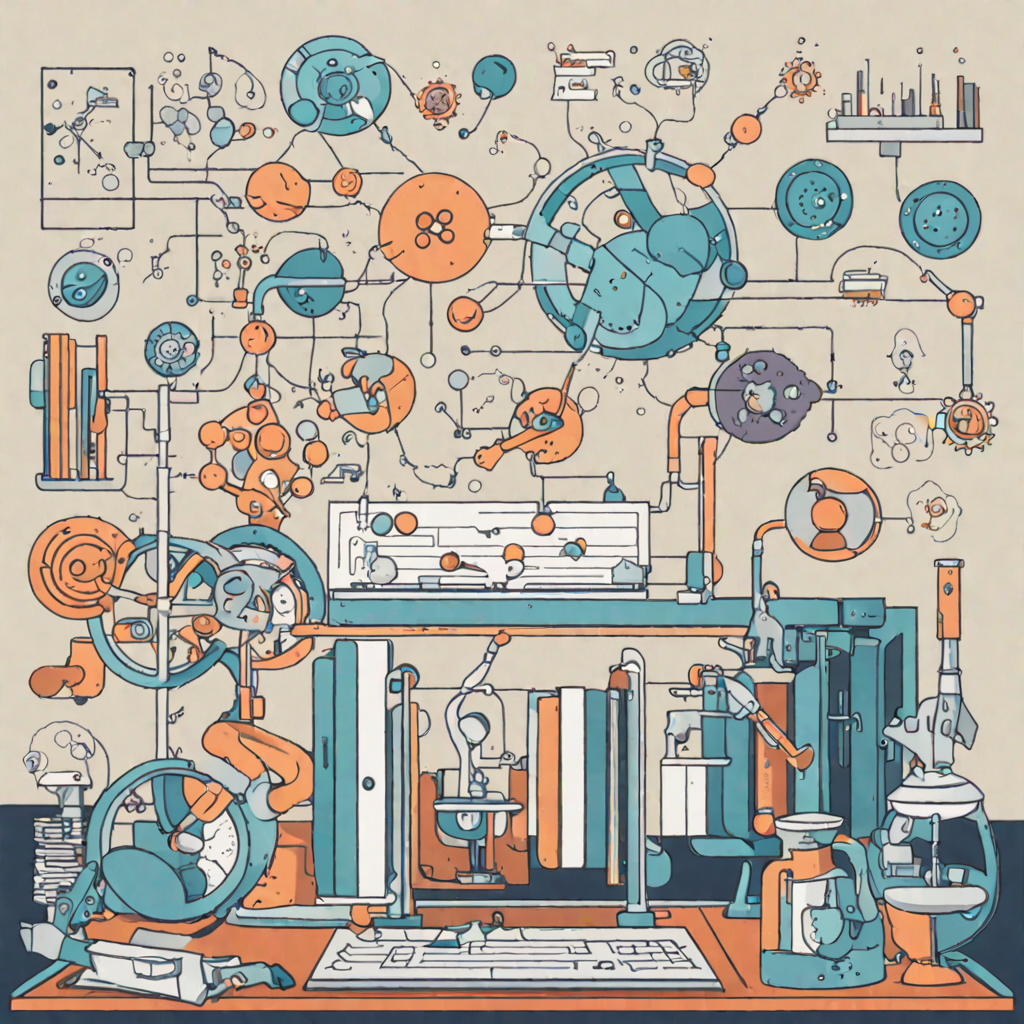
Open Research Agenda Setting
Toolbox on Open Research Agenda Setting Testing the Tools Recommendations on Open Research Agenda SettingSeven participative methodologies (tools) were tested in eight pilot workshop settings at seven Arqus universities.
The aim was to involve stakeholders, especially citizens in general and university students in particular, in the shaping of research agendas in the area of Artificial Intelligence / Digital Transformation and in the area of Climate Change / Sustainability
Click on each workshop below, to see details on the topic, on the specific stakeholders involved, the tools that were tested and the lessons learnt on the use of the participative methodologies in each case.
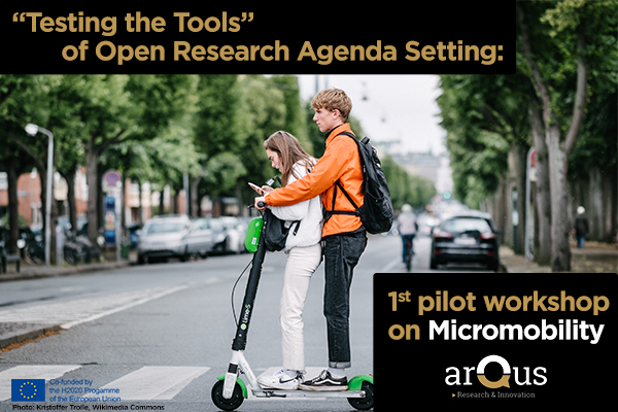
and micromobility

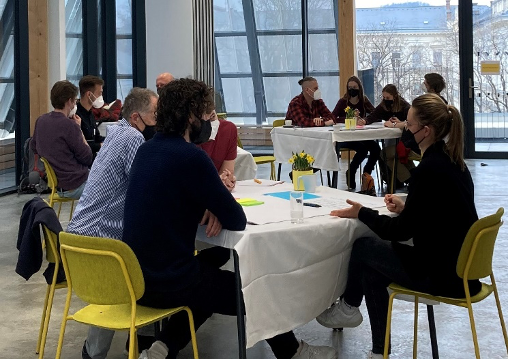
Research and Activism.

Prioritizing research agendas for sustainable transportation: Micromobility in Bergen.
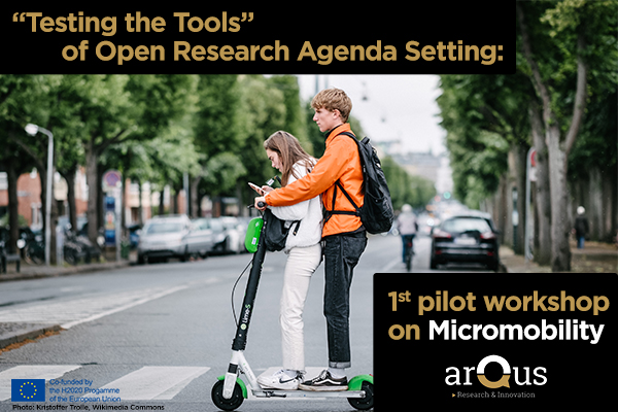
- Place: Bergen
- Date: April 2022
- Workshop’s title: Prioritizing research agendas for sustainable transportation: Micromobility in Bergen.
- Aim: develop research questions surrounding the introduction of rentable electric scooters in Bergen.
- Stakeholders: Open to international participation. Students and members of the UIB community.
- Tool(s): Systems mapping.
Aim
The workshop aimed to formulate research questions relevant to micromobility in Bergen, with a specific focus on rental electric scooters. The recent introduction of these scooters in the city has generated diverse opinions, making it a relevant and relatable topic for research. The aim was to address the divisive nature of this urban transportation method, considering its impact on the environment and public health. By exploring micromobility, the workshop sought to generate research questions that could contribute to urban climate change, recognising the importance of engaging with diverse perspectives and lived experiences in shaping the research agenda.
Stakeholders
Stakeholders for this project included participants who accessed the workshop through the University of Bergen SDG Conference ‘Day 0’ event, with engagement facilitated through the conference website, Zoom for hosting the workshop, and Miro as a collaborative workspace for real-time drawing and writing activities.
ORAS tool implemented
The tool used in this workshop was a modified systems mapping approach. Participants were first provided with a simple systems map outlining known micromobility challenges. Participants then worked together to select an important variable to add to the map. Facilitators then engaged participants in a discussion about the most interesting, confusing or significant variables and relationships. In the final step, participants placed post-its on a matrix to assess the importance and incompleteness of current knowledge on the topic. The additional steps were aimed at structuring the identification of research priorities within the systems mapping process and providing a more comprehensive approach to developing a research agenda.
Outcomes
The workshop produced a system map reflecting the participants’ collective understanding of the issue of micromobility. In addition, participants identified and compiled a list of six research priorities, organising them according to their perceived importance and uncertainty. It is important to note that, due to time constraints, the systems map should not be seen as exhaustive, but rather as a snapshot of the participants’ shared understanding within the allotted time.
Lessons learned
The workshop highlighted that systems mapping is effective in facilitating communication and promoting a shared understanding of complex issues among participants. However, it was noted that systems mapping alone is not sufficient to generate an Open Research Agenda Setting (ORAS). To generate a research agenda, additional activities are needed to help participants identify areas within the systems map that can be translated into research topics. Steps 3 and 4 of the workshop were identified as crucial for this purpose. This insight should be incorporated into the toolbox, emphasising the importance of allowing sufficient time for these final steps. Despite feedback suggesting a smaller group size, the organisers emphasise that the strength of systems mapping lies in the inclusion of different viewpoints, and they maintain that a minimum group size of four participants is appropriate.
Designing a research agenda for a blockchain for civic purposes.

- Place: Granada.
- Date: April 2022.
- Workshop’s title: Designing a research agenda for a blockchain for civic purposes.
- Aim: Lay the foundations of the research work to be carried out by the Blocklab.
- Stakeholders: citizens, students and researchers.
- Tool(s): Brainstorming, four quadrant scenarios, stakeholder mapping.
Aim
The workshop aimed to lay the groundwork for Blocklab, the blockchain laboratory for civic purposes at UGR, in line with its mission to create societal value. The two goals were to enable citizens, regardless of their technical background, to understand and use blockchain technology in their daily lives, and to engage different social sectors in projects that go beyond fintech, fostering a genuine interest in societal improvement rather than speculative models.
Stakeholders
The workshop aimed to engage a broad audience, including individuals within and outside the university community, who were interested in using technology for societal improvement. Technical expertise in blockchain was not a prerequisite, making it accessible to those with or without previous experience in the field. The first session was attended by 11 participants, the majority of whom were citizens and students, making up more than half of the audience. Participants from a research centre took part in order to initiate their understanding of Blockchain and its applications.
ORAS tool implemented
During the workshop, participants engaged in a collaborative brainstorming session facilitated by Medialab UGR staff. Participants were divided into two groups, each contributing to a shared document on Google Drive. In this collaborative space, participants identified and discussed various social issues that could be addressed using blockchain technology. The shared document served as a platform for brainstorming, allowing participants to briefly outline how blockchain could be applied to solve these problems. The workshop concluded with a presentation of the group work, highlighting the different perspectives and ideas that had been generated. In addition, the session included discussions on the thematic priorities of the Blocklab agenda, proposed activities for the lab, challenges in deploying civic blockchain solutions, and a stakeholder mapping analysis to explore the involvement of current and potential stakeholders in addressing the identified issues.
Outcomes
The workshop outcomes for the Blocklab initiative highlighted several civic challenges and proposed blockchain-based solutions. Issues such as lack of blockchain knowledge, gender violence, public administration budgets, electoral problems, public procurement, fake credentials and privacy concerns were identified. Solutions ranged from age-appropriate blockchain education to combating gender violence through secure blockchain evidence storage. The workshop proposed certified voting for transparent public spending, anonymous voting through decentralised applications, and blockchain implementations for secure public contracting and certification. In addition, the idea of a sovereign digital identity in Web 3.0 emerged, emphasising user ownership and protection of personal data. These results provide a roadmap for Blocklab’s future efforts in using blockchain to address societal challenges.
Lessons learned
We found that there was a mismatch between the participants’ initially assumed advanced knowledge of blockchain, and their actual limited understanding. This highlighted the importance of recognising and harnessing the potential of participants to improve their technological knowledge. In addition, the workshop highlighted the growing importance of technology in everyday life, especially in the context of the pandemic, as online tools facilitated the participation of individuals outside the city. The low representation of women in blockchain-related events was noted, highlighting the need for tools to increase women’s participation in the field. Finally, the importance of ongoing training was reiterated on the second day, leading to a proposal to create an online library of training resources to address this need.
Cooperation Café: The Climate Crisis Between Research and Activism.
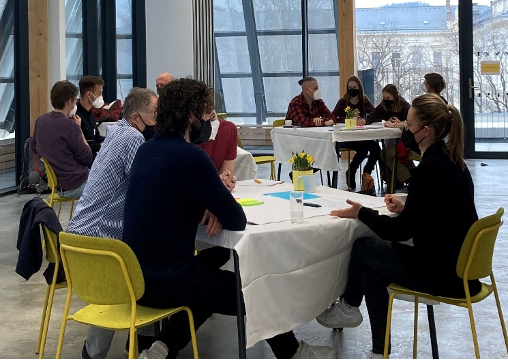
- Place: Graz.
- Date: April 2022.
- Workshop’s title: Cooperation Café: The Climate Crisis Between Research and Activism.
- Stakeholders: researchers and climate change activists.
- ORAS tool implemented: World Café.
Aim
The workshop aimed to facilitate dialogue and collaboration between activists and researchers to bridge the gap in addressing climate change by exploring mutual perceptions, expectations and potential areas for joint efforts. Organised by individuals with expertise in research and event coordination, the session aimed to identify topics for further research that could support effective collaboration in addressing climate-related challenges. Two students assisted with logistics and evaluation, providing valuable insights into emerging key issues and discussions.
Stakeholders
The workshop was attended by a diverse group of stakeholders, mainly researchers and activists interested in climate crisis issues. Other participants, including university students, were reached through various channels such as mailing lists, activist networks (e.g. Fridays for Future) and research networks (e.g. Field of Excellence Climate Change). The group ranged in age from early twenties to mid-fifties and had a variety of academic backgrounds, from first year students to senior researchers.
ORAS tool implemented
The tool used was the World Café, in the form of a three-hour in-person workshop with four discussion tables, each with four participants. The workshop included a welcome and overview, an icebreaker activity, an introduction to the topic, three rounds of table discussions on specific questions, a harvesting session and a final presentation of the workshop results. Two coffee and snack breaks were included and participants were invited to give feedback at the end.
Outcomes
The main tangible outputs of the workshop are the flipcharts produced by the participants, each representing a brainstorming session with prioritised ideas. These serve as an open collection of ideas to be evaluated and condensed for further research or additional events. The broader questions of the workshop will inform the research agenda of a dissertation and future discussions.
Lessons learned
On the positive side, personal invitations by email were effective for recruitment and the university newsletter also contributed. Methods such as the icebreaker and prioritising outcomes using sticky dots were well received by participants. The World Café method was easy to explain and implement and encouraged productive discussions. We learned that recruitment should be more proactive and targeted to ensure a diverse and knowledgeable participant base to achieve greater diversity among participants in terms of origin, ethnicity, educational background and language, which remains a challenge. Overall communication should also be strengthened so that stakeholders feel clearer and more comfortable to respond and participate.
Bürgerdialog – PflanzeKlimaKultur!

- Place: Leipzig.
- Date: June 2022
- Workshop’s title: Bürgerdialog – PflanzeKlimaKultur!
- Aim: Engage citizens in PlanzeKlimaKultur project.
- Stakeholders: citizens, universities and research institutions
- Tools: World Café, Brainstorming
Aim
The aim of the workshop was to engage citizens participating in the broader research project PKK in exploring climate change effects on urban plant diversity through citizen science, where participants observed growth processes, soil conditions, and biodiversity in their climate plots over the project’s duration from 2021 to 2024.
Stakeholders
More than 40 people and institutions participated in this workshop, including the German Center for Integrative the Biodiversity Research – iDiv and the Helmholtz Center for Environmental Research – UFZ
ORAS tool implemented
The tools used, world café and brainstorming, were adapted for a mixed setting in the workshop, with the world café method facilitating informal group discussions and formal dialogue with the city administration, while brainstorming encouraged diverse, unconventional ideas in smaller, changing groups, contributing to the development of climate-resilient city policies and stakeholder involvement.
Outcomes
The outcomes of the workshop include tangible results such as ideas and actions prioritised through discussion and mapped on flipcharts and city maps. The results will be passed on to the Leipzig city administration for further development of environmental protection activities.
Intangible results include participants getting to know each other, discussing progress on the climate plots, and gaining insight into the larger “PflanzeKlimaKultur!
Lessons learned
The lesson learned from the workshop was that while the overall organisation and teamwork was effective, improvements could be made by introducing a mandatory registration system to facilitate better logistical planning, providing more detailed explanations of tools and methods in advance, and considering ways to encourage participants to switch tables for a more dynamic discussion. Despite these challenges, the group discussions were fruitful and the desired outcomes were successfully achieved.
Digital and autism: What are the needs to support pupils and students with autism?
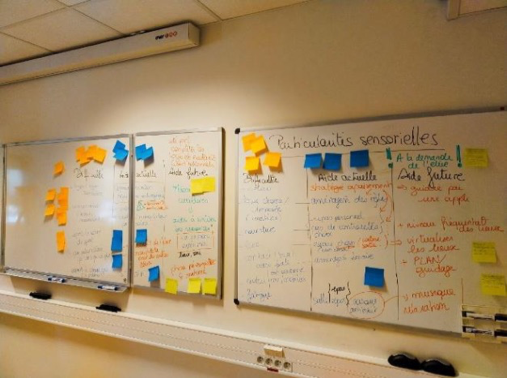
- Place: Lyon
- Date: April 2022
- Workshop’s title: “Numérique et autisme: Quels besoins pour accompagner des élèves et étudiants avec TSA ?” / “Digital and autism: What are the needs to support pupils and students with autism?”
- Aim: Explore requirements for an app to support students with autism.
- Stakeholders: Teachers and university staff, carers, young people with autism, families and local networks.
- Tool implemented: Brainstorming.
Aim
The aim of the workshop was to lay the groundwork for the development of an app for middle and high-schoolers, students with autism, and their teachers by assessing needs, aligning researchers’ expertise with audience needs, and exploring how Artificial Intelligence could support individuals with autism and their education staff.
Stakeholders
The workshop had a diverse group of participants, including two teachers specialising in students with disabilities at the secondary school level, a university administrator from the disability office, a student with autism, a technology company specialising in software and apps for people with autism, a former secondary school teacher who is now an AI and health professional, and a linguistics researcher. In total, there were eight participants with diverse backgrounds and expertise in education, technology, healthcare and linguistics.
ORAS Tool implemented
Brainstorming was the tool used because it was in line with the workshop’s objectives of gathering experience and assessing needs, and proved suitable for the initial phase of the project. In addition, it facilitated extensive exchange and discussion among participants, making it well suited to a project in its early stages and organised within a limited timeframe.
Outcomes
The workshop produced tangible outcomes, including suggestions for an AI-based app, such as personalised emotional tracking, a focus on supporting everyday life rather than therapy, and improving communication between students and teachers. Participants’ suggestions were documented and will be transcribed using a digital tool for future processing.
Lessons learned
The lesson was that, despite skipping some steps and facing time constraints, following the brainstorming rules in the toolbox and creating a non-critical atmosphere allowed for successful idea generation; however, addressing time constraints, including more diverse participants, and emphasising thorough project explanation and participant outreach are crucial considerations for future workshops.
Open Science and Citizen Science: giving voice to citizens towards a new way of developing research in education.
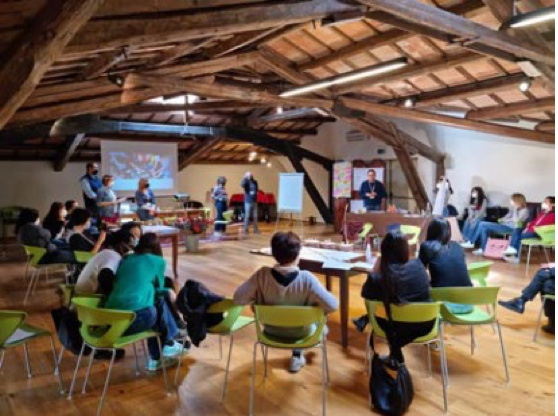
- Place: Padua
- Date: April 2022
- Workshop’s title: Open Science and Citizen Science: giving voice to citizens towards a new way of developing research in education.
- Stakeholders: high-school students, university students, PhD Students, parents, and school teachers.
- ORAS tool implemented: World Café.
Aim
The workshop aimed to implement the interactive World Café method while linking it to the concept of Open Science. By involving different stakeholders with different backgrounds and levels of education, the organisers sought to stimulate discussions and gather perspectives on Open Science and Citizen Science. The overarching objectives included exploring the dynamics of exchange between researchers and the community, constructing a new science development process, and understanding the roles, contributions and impacts of citizens and communities in the research process in education.
Stakeholders
The workshop involved a diverse group of 20 stakeholders of different ages and roles: 3 high school students, 4 university students, 4 PhD students, 7 parents and 2 teachers. Stakeholders were recruited through direct invitations and snowball aiming to encourage group discussions among participants.
ORAS tool implemented
The World Café method was used to facilitate group discussions, asking participants to consider key issues in two rounds, one in the morning and one in the afternoon. The event began with participants gathering in a welcoming area for informal interaction over coffee and pastries. Everyone then proceeded to the main room to register and receive personalised badges. In the morning session, after a brief introduction to the Arqus project, participants introduced themselves. To start the discussion, they were asked to write down keywords related to science, open science, research and citizen science on different coloured post-its.
Outcomes
The workshop produced some interesting results, including a new idea of science, a better understanding of other people’s perspectives and an awareness of the possibility of contributing to science.
These ideas can be used to improve the development of partnerships to do research together and to reduce the gap between people’s lives and research,
have a tangible impact on the real context.
Lessons learned
The success of the workshop was attributed to meticulous planning, effective time management, a well-structured agenda and collaborative teamwork. The lesson learned relates to time management and the need for additional time for participants to engage effectively. It is recommended to ‘adapt, don’t adopt’. The workshop exceeded expectations, generating diverse outputs and fostering positive outcomes in terms of products, outcomes, relationships, alliances, group interactions, team collaboration and exchange of ideas and perspectives. The Arqus toolbox could provide additional insights and ideas to improve the adaptability and varied use of its tools.
Entrepreneurship in the digital age
- Place: Padua.
- Date: April 2022
- Workshop’s title: Fare impresa nell’epoca digitale (Entrepreneurship in the digital age)
- Aim: Accompany students in their job vocational path.
- Stakeholders: Bachelor students
- Tools: Brainstorming
Aim
The workshop “Fare impresa nell’epoca digitale” (Entrepreneurship in the Digital Age) is part of a wider initiative within the Law and Technology undergraduate degree at the University of Padua. This initiative, known as “La formazione dell’esperto” (The formation of an expert), aims to support students in their professional careers by providing insights into interdisciplinary career opportunities and fostering an entrepreneurial mindset. This specific workshop focused on entrepreneurship in the digital age within this overarching programme.
Stakeholders
The stakeholders for the workshop were students enrolled in the Law and Technology bachelor’s degree program, aiming to explore interdisciplinary career opportunities and develop an entrepreneurial mindset for their future professional paths.
ORAS tool implemented
The method used to collect information and feedback from the students was a twofold questionnaire approach using the brainstorming tool. The first questionnaire, presented before the event, aimed to capture students’ impressions and expectations ex-ante. The second questionnaire, proposed at the end of the workshop, aimed to analyse the extent to which the topics addressed reflected the students’ needs and interests. Both questionnaires used the brainstorming tool with open-ended responses to facilitate the collection of information.
Outcomes
The resulting brainstorming illustrates that not all options had been discussed informally in the previous conversations. This result was observed in both the pre-workshop and post-workshop surveys. However, some differences between the two and the addition of new elements were noted. Due to the limited time available for the workshop, the brainstorming should not be considered as complete or comprehensive. Rather, it represents the state of the participants’ common understanding that could be expressed within the time available.
Lessons learned
The lesson learnt from the workshop is that brainstorming is generally an effective tool for mapping and understanding the needs of both the general and specific audience, and is applicable to both large and small gatherings. Although a guided brainstorming was chosen in the hope of reaching a broad audience, stakeholders took the opportunity to improve the quality of their responses through comments and suggestions. However, it was recognised that a single brainstorming session is not sufficient to generate an Open Research Agenda (ORAS). In order to produce an open research agenda on interdisciplinary career and vocational guidance, the workshop should be repeated several times, preferably with a homogeneous base rate. This valuable insight should be included in the toolbox, together with the recommendation to allow sufficient time in the workshop for these crucial final steps.
Leading Climate Actions: Strategical and Practical Guidelines
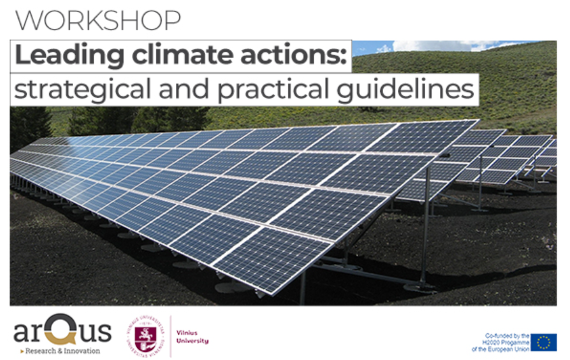
- Place: Vilnius.
- Date: April 2022.
- Workshop’s title: Leading climate actions: strategical and practical guidelines
- Aim: Turning VU into a “green university”
- Stakeholders: VU Community: students, researchers, managerial and administrative staff.
- Tools: Brainstorming.
Aim
The aim of the workshop was to identify individuals within Vilnius University (VU) who share an interest in transforming VU into a ‘green university’. The aim of the workshop was to bring these stakeholders together to jointly brainstorm solutions and propose actions that VU could take to effectively address the climate change crisis and improve its sustainability. The ultimate goal was to lay the groundwork for an initial roadmap that will shape the VU’s Greening Action Plan.
Stakeholders
The stakeholders in this workshop were members of the Vilnius University (VU) community who were interested in transforming the university into a ‘green university’. This group included doctoral students with a specific interest in climate change research, undergraduate students, and administrative and managerial staff. The aim was to engage and map members of the VU community who were passionate about addressing climate change, promoting sustainability and contributing to the development of a Greening Action Plan for the University.
ORAS tool implemented
The workshop used a combination of brainstorming and stakeholder mapping as tools. First, participants were engaged in brainstorming sessions to discuss and propose solutions for Vilnius University (VU) to address climate change and improve sustainability, with the aim of developing an initial roadmap for VU’s greening action plan. Stakeholder mapping was then used to identify individuals within VU who expressed an interest in transforming the university into a ‘green university’. The collaborative nature of brainstorming allowed for the generation of diverse ideas, while stakeholder mapping facilitated the identification and categorisation of individuals with shared interests, contributing to the development of a comprehensive strategy.
Outcomes
The workshop produced both tangible and intangible results. A White Paper on the VU Greening Action Plan was produced, consolidating ideas into a comprehensive document proposing actions for Vilnius University (VU) to improve sustainability. The plan outlined objectives, proposed actions and evaluation parameters, providing a structured framework. In addition, the workshop facilitated the formation of a network of individuals committed to the university’s greening strategy, fostering collaboration across faculties. This was the first time in the VU’s history that people from different disciplines had worked together on environmental initiatives. The VU administration’s involvement in the workshop demonstrated its interest and the potential for integrating the ideas and goals generated into the university’s agenda. The established network continues to drive collaboration and communication for ongoing environmental initiatives.
Lessons learned
Key lessons from the workshop include the effectiveness of communication, from message delivery to ongoing post-workshop interaction through Internet channels. The success of a bottom-up, voluntary participation approach was evident, encouraging diverse engagement across different education and research sectors. However, challenges arose in the group discussions, highlighting the importance of sticking to the agenda and including supporting materials for better structure. In order to enhance the discussions, it was suggested to form heterogeneous groups based on the knowledge level of the participants. Despite these challenges, the workshop successfully achieved its primary goal of mapping and gathering individuals, sharing ideas and gauging mutual willingness to continue working together on the university’s greening agenda. The Arqus Toolbox for Open Research Agenda Setting played a crucial role in organising the workshop, providing valuable insights and a practical brainstorming method that facilitated the initial stages of collaboration.


